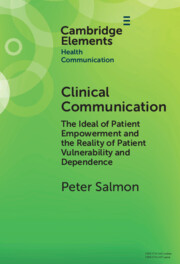Refine search
Actions for selected content:
26 results
Chapter 3 - What Compassion Is Not
- from Part I - Compassion in Healthcare
-
- Book:
- Handbook of Compassion in Healthcare
- Published online:
- 27 June 2025
- Print publication:
- 17 July 2025, pp 27-34
-
- Chapter
-
- You have access
- Open access
- HTML
- Export citation
Clinicians’ perspectives on a primary healthcare intervention to reduce antibiotic prescription for acute lower respiratory tract infections in Barcelona (Spain): a qualitative study
-
- Journal:
- Primary Health Care Research & Development / Volume 26 / 2025
- Published online by Cambridge University Press:
- 04 July 2025, e54
-
- Article
-
- You have access
- Open access
- HTML
- Export citation
Building boundary-crossers in clinical-translational research: An exploratory study of a novel communication intervention
-
- Journal:
- Journal of Clinical and Translational Science / Volume 9 / Issue 1 / 2025
- Published online by Cambridge University Press:
- 28 April 2025, e107
-
- Article
-
- You have access
- Open access
- HTML
- Export citation

Communication Skills for Business Professionals
-
- Published online:
- 25 February 2025
- Print publication:
- 15 January 2025
-
- Textbook
- Export citation

Clinical Communication
- The Ideal of Patient Empowerment and the Reality of Patient Vulnerability and Dependence
-
- Published online:
- 18 January 2025
- Print publication:
- 13 February 2025
-
- Element
- Export citation
Chapter 18 - Education for Acute Hospital Staff
-
-
- Book:
- Seminars in Consultation-Liaison Psychiatry
- Published online:
- 04 January 2024
- Print publication:
- 18 January 2024, pp 301-317
-
- Chapter
- Export citation
Chapter 6 - Evidence-Based Cancer Interventions
-
- Book:
- Parenting through Cancer
- Published online:
- 15 September 2022
- Print publication:
- 22 September 2022, pp 75-90
-
- Chapter
- Export citation
Development and feasibility of a communication training to assist caregivers with advanced care planning
-
- Journal:
- Palliative & Supportive Care / Volume 21 / Issue 2 / April 2023
- Published online by Cambridge University Press:
- 14 September 2022, pp. 188-195
-
- Article
- Export citation
Communication skills training for medical residents: Enhancing a psychosocial approach of patient care
-
- Journal:
- Palliative & Supportive Care / Volume 21 / Issue 3 / June 2023
- Published online by Cambridge University Press:
- 08 March 2022, pp. 392-398
-
- Article
- Export citation
Communication skills training in psychiatry
-
- Journal:
- BJPsych Advances / Volume 29 / Issue 1 / January 2023
- Published online by Cambridge University Press:
- 07 January 2022, pp. 56-67
- Print publication:
- January 2023
-
- Article
-
- You have access
- HTML
- Export citation
Communication in clinical research: Uncertainty, stress, and emotional labor
-
- Journal:
- Journal of Clinical and Translational Science / Volume 6 / Issue 1 / 2022
- Published online by Cambridge University Press:
- 08 November 2021, e11
-
- Article
-
- You have access
- Open access
- HTML
- Export citation
Improving the way healthcare professionals deliver different news to families during pregnancy or at birth: a qualitative study
-
- Journal:
- Primary Health Care Research & Development / Volume 22 / 2021
- Published online by Cambridge University Press:
- 29 March 2021, e10
-
- Article
-
- You have access
- Open access
- HTML
- Export citation
30 - Parent–Teacher Relationships
- from Part VI - Family Connections and Life Transitions
-
-
- Book:
- The Cambridge Handbook of Applied School Psychology
- Published online:
- 18 September 2020
- Print publication:
- 17 September 2020, pp 519-537
-
- Chapter
- Export citation
Chapter 1 - Introduction: communication in organisations
- from Part One - Understanding communication
-
- Book:
- Communication Skills for Business Professionals
- Published online:
- 06 April 2020
- Print publication:
- 12 June 2019, pp 2-23
-
- Chapter
- Export citation
Self-assessment of residents in respect of attitudes to communication
-
- Journal:
- Primary Health Care Research & Development / Volume 20 / 2019
- Published online by Cambridge University Press:
- 12 April 2019, e32
-
- Article
-
- You have access
- Open access
- HTML
- Export citation
Training Weed Scientists for Extension
-
- Journal:
- Weed Technology / Volume 1 / Issue 2 / April 1987
- Published online by Cambridge University Press:
- 12 June 2017, pp. 181-183
-
- Article
- Export citation
Yesterday’s Doctors: The Human Aspects of Medical Education in Britain, 1957–93
-
- Journal:
- Medical History / Volume 61 / Issue 1 / January 2017
- Published online by Cambridge University Press:
- 21 December 2016, pp. 48-65
-
- Article
-
- You have access
- Open access
- HTML
- Export citation
Spouses’ experience of living with a partner diagnosed with a dementia: a synthesis of the qualitative research
-
- Journal:
- International Psychogeriatrics / Volume 28 / Issue 4 / April 2016
- Published online by Cambridge University Press:
- 11 January 2016, pp. 537-556
-
- Article
- Export citation
The effectiveness of communication-skills training interventions in end-of-life noncancer care in acute hospital-based services: A systematic review
-
- Journal:
- Palliative & Supportive Care / Volume 14 / Issue 4 / August 2016
- Published online by Cambridge University Press:
- 17 December 2015, pp. 433-444
-
- Article
- Export citation
Enhancing student communication during end-of-life care: A pilot study
-
- Journal:
- Palliative & Supportive Care / Volume 13 / Issue 6 / December 2015
- Published online by Cambridge University Press:
- 17 April 2015, pp. 1651-1661
-
- Article
- Export citation
